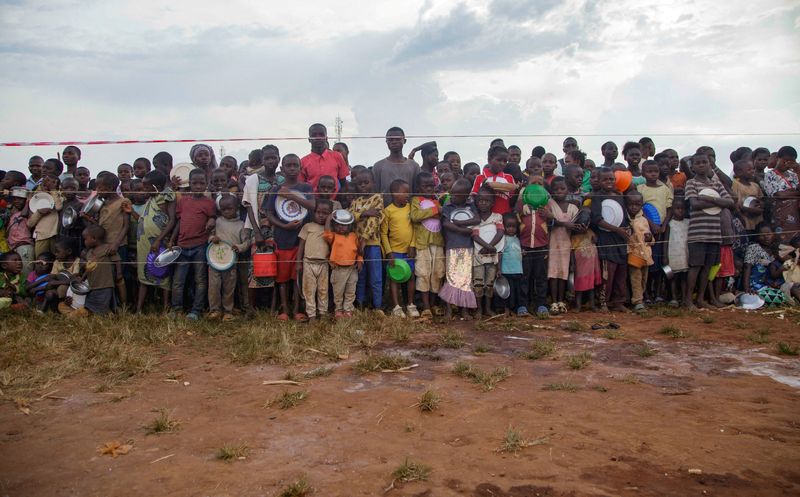(Reuters)-While Rwanda supported by Rwanda ended in the largest city of Eastern Congo, the retirement army soldiers walked within the house of Suzanne Amisi Wilonja near the airport to shoot outside, without a distinction and her 10-year-old son Sylvain shot in the head.
The family collisions prevented the family from reaching doctors until the next morning, and by that time Sylvain had long been dead, one of a growing number of child victims of fatal violence spread through the Mineral Rich region.
“We were afraid to take him to the hospital because the soldiers were pressing at our door,” a tearing Wilonja told Reuters, describing how she saw her son die.
Familiar news and daily pleasure, exactly in your inbox
Watch yourself-the Yodel is the source for daily news, entertainment and feel-good stories.
A spokesperson for the army did not respond to a request for comments about the incident at the end of January in Goma. Reuters could not confirm the details independently.
The United Nations have warned about increasing the recruitment of children, abductions, murders and sexual violence, while the rebels, known as M23, continue after seizing more territory in East Congo than ever before.
A military public prosecutor has accused crimes, including rape and murder of the flights.
Last week the UN Human Rights Office said that M23 hunters briefly executed three children in Bukavu, the second largest city in the region that fell earlier this month. A spokesperson for M23 has denied the statement.
The victims in Bukavu held weapons that were left by fleeing soldiers, Patrice Vahard, head of the Law Office in Kinshasa, told Reuters.
He added that he could not say exactly how many children were killed or injured in comparable circumstances, stating challenges to investigate if fighting exist.
“There is a climate of terror in Bukavu that makes it difficult for parents to testify,” he said, but “one child is enough – we don't need any figures”.
Increase
The M23 offensive is the most serious escalation in more than a decade of the long-term conflict in Eastern Congo, rooted in the landing of Rwanda's genocide of 1994 in Congo and the battle for combating Congo's enormous mineral resources.
Rwanda rejects accusations that the M23 supports the latter in a long line of ethnic Tutsi-conducted rebel movements to appear in Congo's East, with weapons and troops. It says that it defends itself against the threat of a Hutu militia, which says it is fighting alongside the Congolese army.
The recent hostilities have brought an increase in sexual violence that the region has long plagued.
In the week after Goma fell, 42 health care facilities in and around GOMA 572 rattled rape cases, including 170 children, said Lianne Gutcher, head of communication for the children's office of the UN in Congo.
That has risen from 95 cases of rape per week in 2024 in the same facilities, she said.
“Rape was committed by armed men. It is suspected that all parties have committed sexual violence in the conflict,” she said.
A medical employee in Goma who treats survivors of sexual violence, said there was an increase in “serious” cases.
“There were women and girls who were raped to the point to destroy their blowing,” said the employee, speaking of anonymity for security reasons.
“We have not seen anything for a long time.”
Bende -Appeals of young girls have been reported in both Goma and Bukavu, although data was still collected, Vahard said.
Congo has not commented on reports about his troops and has also called on the UN to investigate violations that blames M23 rebels and Rwanda. Rwanda has rejected any responsibility. M23 rebels did not respond to requests for comments.
'Most vulnerable'
The UN refugee agency has also described that children collapse with exhaustion while their families try to escape to Burundi to stay ahead of the fighting.
“If they follow their parents, they are the most vulnerable. They can't run like their parents,” said Vahard.
Even while fighting continues in the provinces of North and South Kivu, M23 sworn to restore the Order in Goma and Bukavu, to reopen ports and announce plans to redesign police officers.
It is too late for people like 19-year-old Emile Bashali, whose baby sister was killed when a bomb hit the parental home when Goma fell.
“The baby started crying. I ran into the room to get her,” but she had sustained serious shrapnel wounds, he said.
Doctors in the hospital tried to operate, but “30 minutes later they came to tell us that our baby had died,” Bashali said. “The name of our baby was Keyna. She was a year and four months old.”
(Reporting by Congo Newsroom; Additional reporting by Sonia Rolley in Paris and Ange Adihe Kasongo in Kinshasa; Write by Robbie Corey-Boulet; Edit by Alex Richardson)

